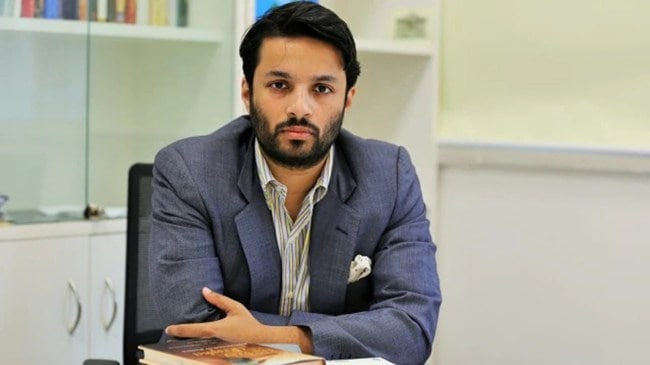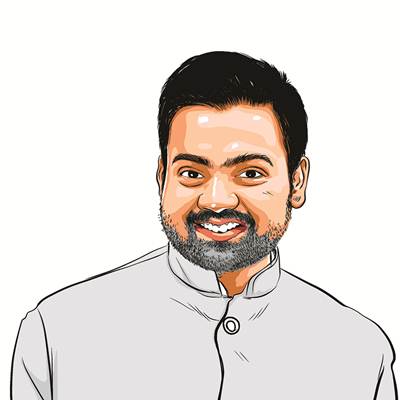Opinion Mahmudabad case: Public discourse must align with constitutional responsibility
The integrity of constitutional rights is compromised when free speech is filtered through political convenience
 Mahmudabad was arrested on Sunday for remarks he posted on social media that, an FIR alleged, “disparaged women officers in the Indian Armed Forces and promoted communal disharmony”. (Source: File)
Mahmudabad was arrested on Sunday for remarks he posted on social media that, an FIR alleged, “disparaged women officers in the Indian Armed Forces and promoted communal disharmony”. (Source: File) Any meaningful discussion on freedom of expression in India is incomplete without understanding the First Amendment to the Constitution, introduced in 1951 under the leadership of Prime Minister Jawaharlal Nehru, often hailed as the custodian of constitutional morality. This amendment was not merely a legal adjustment — it fundamentally reshaped India’s constitutional philosophy, tilting the balance from individual liberty towards societal order. Prior to this amendment, Article 19(2) permitted only narrow restrictions on speech, covering defamation, contempt of court, and state security. Early judicial interpretations offered expansive protections for free speech, often frustrating governmental efforts to impose limits. In response to mounting political tensions, the Nehru government sought to revise the framework.
The First Amendment broadened the scope for restrictions to include “public order”, “friendly relations with foreign states”, “incitement to an offence”, “morality” and “decency”. This move enabled both preventive and punitive actions by the state, thus legitimising censorship and restrictions on dissent. It marked a decisive turn from a libertarian model of speech towards one centred on national stability — a legacy that continues to influence India’s constitutional discourse.
The integrity of constitutional rights is compromised when free speech is filtered through political convenience. A dual standard — liberal in opposition but repressive in power — does the greatest disservice to the democratic ideal. Whether it’s free speech absolutism or excessive restriction, both become dangerous when wielded selectively.
In recent times, the judiciary has added a crucial perspective. Justice Surya Kant, in a case involving a social media post by a professor at a reputed private institution, remarked that politics should not be pursued in times of national crisis, and cheap popularity must not come at the cost of national grit and resilience. His remarks underscore the need for public discourse to align with constitutional responsibility. One must also reflect on Prime Minister Narendra Modi’s experience of enduring relentless verbal attacks for two decades — being called “maut ka saudagar”, “psychopath”, “coward”, “neech”, and more. Despite these provocations, institutions have endured, but they highlight the need for consistency in defending free speech across the political spectrum.
Historical episodes such as the Emergency, the Aseem Trivedi case (2012) or the derogatory portrayal of B R Ambedkar in NCERT textbooks also expose the inconsistencies of those who now claim the moral high ground. No political party can monopolise the language of liberty while glossing over its own record.
This debate is not unique to India. Across the world, from London to Washington, DC, the very foundations of the liberal democratic order are being questioned. Thinkers like Francis Fukuyama, who once envisioned the “end of history” with liberal democracy’s dominance, have since reconsidered their positions. The core question now is: Who truly safeguards liberal values — and in whose name are they exercised?
In this context, John Stuart Mill’s warning in On Liberty is prescient: “The liberty of the individual must be thus far limited; he must not make himself a nuisance to other people..”
Today, it is important to create a balance between freedom and responsibility. Several political leaders have made controversial remarks following Operation Sindoor, undermining the apolitical and professional nature of India’s armed forces. Ram Gopal Yadav (SP) highlighted the caste and religion of IAF officers, injecting identity politics into military discourse. Ajay Rai (UP Congress chief) mocked the Rafale jet, a move exploited by Pakistani media. Such conduct not only demoralises the armed forces but also endangers national unity and strategic interests. In matters of defence, restraint, responsibility, and respect for institutional sanctity are essential to safeguard the spirit of Indian democracy and sovereignty.
Freedom and rights must be equally accessible to everyone, without any form of discrimination. I was “cancelled” from speaking at a reputed institution — perhaps due to my political beliefs or social origin — though no reasons were ever shared with me. This experience reveals a deep hypocrisy: When a third-generation, pedigreed academic from an elite background is involved, there is immediate outcry and mobilisation. But when it comes to someone from a subaltern background, the silence is deafening. This double standard undermines the very spirit of democratic discourse. The right to express, engage, and be heard cannot be the exclusive privilege of the elite. It must be protected for all, especially for those who challenge dominant narratives from the margins.
The writer is national spokesperson of the BJP




